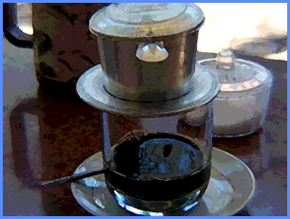Brewing The Iraq War: The Slow Drip Continues genre: Just Jihad & Polispeak & Six Degrees of Speculation

Looks like the White House may once again need to modify its explanation of the decisions and determinations made prior to invading Iraq. Time and again the American voter has been told that the President simply responded to the intelligence that was available at the time…seemingly suggesting that he and his neoconservative cohorts had no particular axe to grind.
Today we find further evidence that the administration ignored warnings from the CIA that an invasion of Iraq and the toppling of the Hussein regime might “lead to a dangerous period of internal violence and provide a boost to terrorists". If obtaining the full truth about the Iraq invasion were akin to the making of a good cup of coffee, then complete disclosure must be viewed as the ultimate in slow drip “brewing". Sadly, the bitter taste of the few sips we’ve been given suggest that the final product will be most foul and, more than likely, completely unpalatable.
In a move sure to raise even more questions about the decision to go to war with Iraq, the Senate Select Committee on Intelligence will on Friday release selected portions of pre-war intelligence in which the CIA warned the administration of the risk and consequences of a conflict in the Middle East.
Among other things, the 40-page Senate report reveals that two intelligence assessments before the war accurately predicted that toppling Saddam could lead to a dangerous period of internal violence and provide a boost to terrorists. But those warnings were seemingly ignored.
In January 2003, two months before the invasion, the intelligence community's think tank — the National Intelligence Council — issued an assessment warning that after Saddam was toppled, there was “a significant chance that domestic groups would engage in violent conflict with each other and that rogue Saddam loyalists would wage guerilla warfare either by themselves or in alliance with terrorists."
Perhaps I’m wrong, but I interpret this to mean that, despite repeated assertions by the administration to the contrary, there were clear indications of what could be expected in the aftermath of an invasion. One is left to wonder just how overwhelming the zeal to topple Hussein must have been at the time. Even if one were inclined to conclude that the stated reasoning for the war wasn’t contrived or manipulated, wouldn’t it still have been prudent for the administration to heed the warnings about the obstacles that would likely be encountered upon Hussein’s removal? If for no other reason, shouldn’t concerns about committing loyal and dedicated servicemen have led those in charge to consider the ramifications of an ill-conceived and hastily executed endeavor?
The report goes on to point out that the invasion may well fuel further radicalization and enhance the recruitment efforts of anti-American terrorist organizations…almost the exact opposite of one of the many justifications for the invasion that have been offered by the administration.
It also warned that “many angry young recruits" would fuel the rank of Islamic extremists and "Iraqi political culture is so embued with mores (opposed) to the democratic experience … that it may resist the most rigorous and prolonged democratic tutorials."
None of those warnings were reflected in the administration's predictions about the war.
In fact, Vice President Cheney stated the day before the war, “Now, I think things have gotten so bad inside Iraq, from the standpoint of the Iraqi people, my belief is we will, in fact, be greeted as liberators."A second assessment weeks before the invasion warned that the war also could be “exploited by terrorists and extremists outside Iraq."
“These should have been very sobering reports," says Michael O’Hanlon, military analyst at the Brookings Institution. “The administration should have taken them very serious in preparing plans for a difficult post-Saddam period. And yet the administration did not do so."
William Harlow, part of Tenet’s senior intelligence staff and co-author with Tenet on his book, added: “Although the intelligence got the WMD case in Iraq wrong, it got the dangers of a post-invasion Iraq quite right. They raised serious questions about what would face U.S. troops in a post invasion Iraq. The intelligence laid out a number of issues of concern. It’s unclear if administration officials paid any attention to those concerns."
On this Memorial Day Weekend, I can only imagine how this kind of information impacts the families of soldiers who have lost their lives in Iraq. A soldier’s love of country and the desire he or she exhibits to serve and protect this nation ought to be held sacred by those entrusted to risk the lives of these fine young Americans. A mother and father ought to be able to expect that our nation’s leaders will view their child as if he or she were their own…not as the vehicle by which small men satisfy large ambitions and egos.
Post a comment